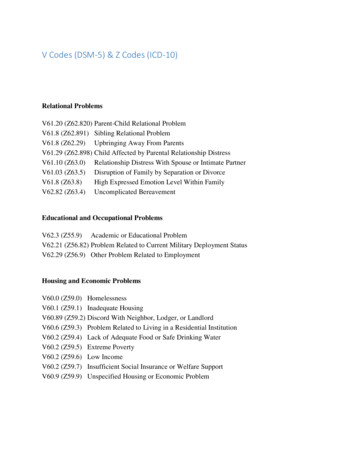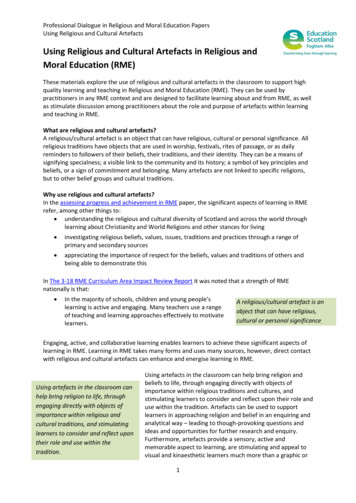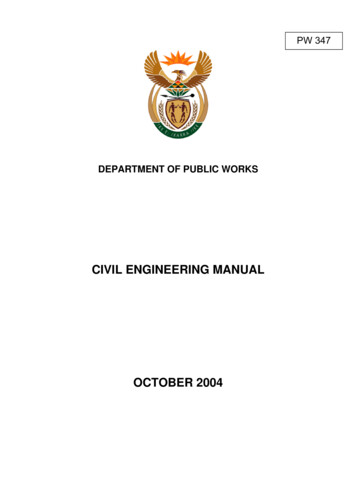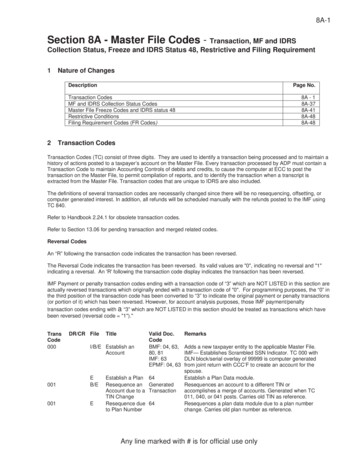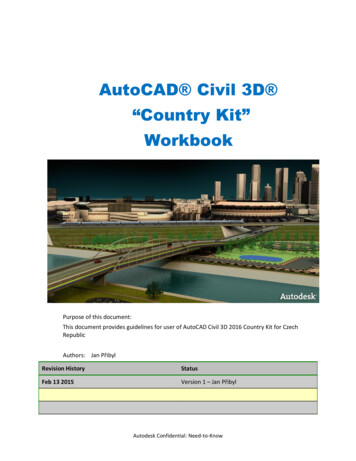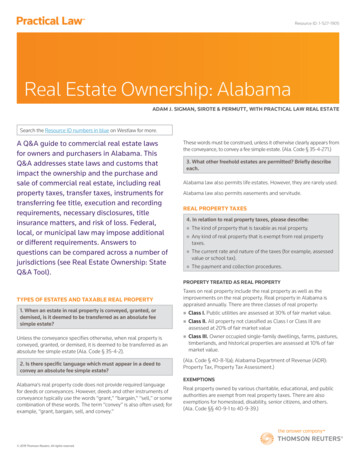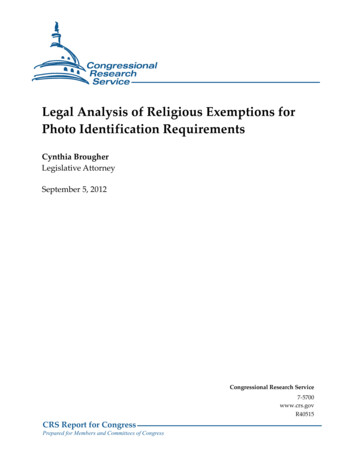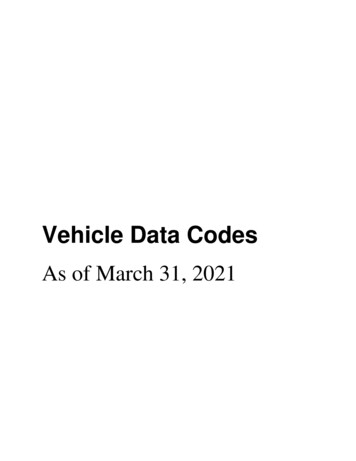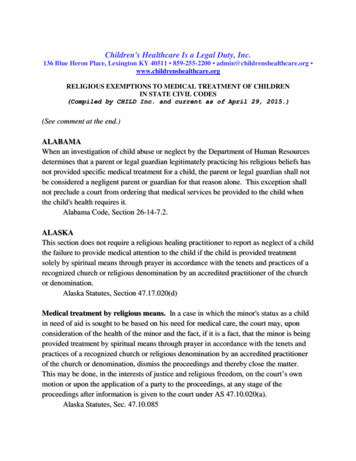
Transcription
Children's Healthcare Is a Legal Duty, Inc.136 Blue Heron Place, Lexington KY 40511 859-255-2200 admin@childrenshealthcare.org www.childrenshealthcare.orgRELIGIOUS EXEMPTIONS TO MEDICAL TREATMENT OF CHILDRENIN STATE CIVIL CODES(Compiled by CHILD Inc. and current as of April 29, 2015.)(See comment at the end.)ALABAMAWhen an investigation of child abuse or neglect by the Department of Human Resourcesdetermines that a parent or legal guardian legitimately practicing his religious beliefs hasnot provided specific medical treatment for a child, the parent or legal guardian shall notbe considered a negligent parent or guardian for that reason alone. This exception shallnot preclude a court from ordering that medical services be provided to the child whenthe child's health requires it.Alabama Code, Section 26-14-7.2.ALASKAThis section does not require a religious healing practitioner to report as neglect of a childthe failure to provide medical attention to the child if the child is provided treatmentsolely by spiritual means through prayer in accordance with the tenets and practices of arecognized church or religious denomination by an accredited practitioner of the churchor denomination.Alaska Statutes, Section 47.17.020(d)Medical treatment by religious means. In a case in which the minor's status as a childin need of aid is sought to be based on his need for medical care, the court may, uponconsideration of the health of the minor and the fact, if it is a fact, that the minor is beingprovided treatment by spiritual means through prayer in accordance with the tenets andpractices of a recognized church or religious denomination by an accredited practitionerof the church or denomination, dismiss the proceedings and thereby close the matter.This may be done, in the interests of justice and religious freedom, on the court’s ownmotion or upon the application of a party to the proceedings, at any stage of theproceedings after information is given to the court under AS 47.10.020(a).Alaska Statutes, Sec. 47.10.085
2ARIZONA13. “Dependent child”:(a) Means a child who is adjudicated to be:(i) In need of proper and effective parental care and control and who has no parent orguardian, or one who has no parent or guardian willing to exercise or capable ofexercising such care and control.(ii) Destitute or who is not provided with the necessities of life, including adequate food,clothing, shelter or medical care, or whose home is unfit by reason of abuse, neglect,cruelty or depravity by a parent, a guardian, or any other person having custody or care ofthe child. . . .(b) Does not include a child who in good faith is being furnished Christian Sciencetreatment by a duly accredited practitioner if none of the circumstances described insubdivision (a) of this paragraph exists.Arizona Revised Statutes Ann. §8-201.13(b)Prohibition: [N]o child who in good faith is being furnished Christian Science treatmentby a duly accredited practitioner shall, for that reason alone, be considered to be anabused, neglected or dependent child.Arizona Revised Statutes Ann. §8-201.01[N]o child who in good faith is being furnished Christian Science treatment by a dulyaccredited practitioner shall, for that reason alone, be considered to be an abused,neglected or dependent child.Arizona Revised Statutes, §8-531.01 (deals with termination of parental rights)ARKANSASNothing in this chapter shall be construed to mean a child is neglected or abused for thesole reason he or she is being provided treatment by spiritual means through prayer alonein accordance with the tenets and practices of a recognized church or religiousdenomination by a duly accredited practitioner thereof in lieu of medical or surgicaltreatment. . . .Arkansas Statutes §9-30-103(5)BUpon completion of its investigation, the Department of Human Services shall determinethat the allegations of child maltreatment are: (1) Unsubstantiated [or] (2) True.A determination of true shall not be entered when a parent practicing hisreligious beliefs does not, for that reason alone, provide medical treatment
3for a child, but in lieu of such treatment the child is being furnished withtreatment by spiritual means alone, through prayer, in accordance with arecognized religious method of healing by an accredited practitioner.Arkansas Statutes §12-12-512 (a)(2)CCALIFORNIAWhenever it is alleged that a child comes within the jurisdiction of the court on the basisof the parent's or guardian's willful failure to provide adequate medical treatment orspecific decision to provide spiritual treatment through prayer, the court shall givedeference to the parent's or guardian's medical treatment, nontreatment, or spiritualtreatment through prayer alone in accordance with the tenets and practices of arecognized church or religious denomination, by an accredited practitioner thereof, andshall not assume jurisdiction unless necessary to protect the child from suffering seriousphysical harm or illness. In making its determination, the court shall consider (1) thenature of the treatment proposed by the parent or guardian, (2) the risks to the child posedby the course of treatment or nontreatment proposed by the parent or guardian, (3) therisk, if any, of the course of treatment being proposed by the petitioning agency, and (4)the likely success of the courses of treatment or nontreatment proposed by the parent orguardian and agency. The child shall continue to be a dependent child pursuant to thissubdivision only so long as is necessary to protect the child from risk of suffering seriousphysical harm or illness.Calif. Welfare and Institutions Code 300(b)No child shall be found to be [suffering serious emotional damage or at substantial risk ofsuffering serious emotional damage as a result of the conduct of the parent or guardian] ifthe willful failure of the parent or guardian to provide adequate mental health treatment isbased on a sincerely held religious belief and if a less intrusive judicial intervention isavailable.Calif. Welfare and Institutions Code §300( c)In any case in which a child is alleged to come within the provisions of Section 300 onthe basis that he or she is in need of medical care, the court, in making that finding, shallgive consideration to any treatment being provided to the child by spiritual meansthrough prayer alone in accordance with the tenets and practices of a recognized churchor religious denomination by an accredited practitioner thereof.Calif. Welfare and Institutions Code §300.5For the purposes of this chapter, a child receiving treatment by spiritual means asprovided in Section 16508 of the Welfare and Institutions Code shall not for that reasonalone be considered an abused or neglected child.California Welfare and Institutions Code §18950.5
4No child who in good faith is under treatment solely by spiritual means through prayer inaccordance with the tenets and practices of a recognized church or religious denomination by a duly accredited practitioner thereof shall, for that reason alone, be considered tohave been neglected within the purview of this chapter.California Welfare and Institutions Code §16509.1Cultural and religious child-rearing practices and beliefs which differ from generalcommunity standards shall not in themselves create a need for child welfare servicesunless the practices present a specific danger to the physical or emotional safety of thechild.California Welfare and Institutions Code §16509COLORADONo child who in lieu of medical treatment is under treatment solely by spiritual meansthrough prayer in accordance with a recognized method of religious healing shall, for thatreason alone, be considered to have been neglected or dependent within the purview ofthis article. However, the religious rights of a parent, guardian, or legal custodian shallnot limit the access of a child to medical care in a life-threatening situation or when thecondition will result in serious handicap or disability. In order to make a determinationas to whether the child is in a life-threatening situation or that the child’s condition willresult in serious disability, the court may, as provided under section 19-1-104(3), order amedical evaluation of the child. If the court determines, on the basis of any relevantevidence before the court, including the medical evaluation ordered pursuant to thissection, that the child is in a life-threatening situation or that the child’s condition willresult in serious disability, the court may, as provided under section 19-1-104(3), orderthat medical treatment be provided for the child. A child whose parent, guardian, or legalcustodian inhibits or interferes with the provision of medical treatment in accordancewith a court order shall be considered to have been neglected or dependent for thepurpose of this article and injured or endangered for the purposes of section 18-6-401,C.R.S.(2) A method of religious healing shall be presumed to be a recognized method ofreligious healing if:(a)(I) Fees and expenses incurred in connection with such treatment are permitted to bededucted from taxable income as “medical expenses” pursuant to regulations or rulespromulgated by the United States Internal Revenue Service, and
5(II) Fees and expenses incurred in connection with such treatment are generallyrecognized as reimbursable health care expenses under medical policies of insuranceissued by insurers licensed by this state; or(b) Such treatment provides a rate of success in maintaining health and treating diseaseor injury that is equivalent to that of medical treatment.Colorado Revised Statutes §19-3-103CONNECTICUTFor the purposes of this section, the treatment of any child or youth by an accreditedChristian Science practitioner, in lieu of treatment by a licensed practitioner of thehealing arts, shall not of itself constitute neglect or maltreatment.Connecticut General Statutes Chap. 815t §46B-120(8)For the purposes of sections 17a-101 to 17a-103, inclusive, and sections 46b-129a, thetreatment of any child by a Christian Science practitioner in lieu of treatment by alicensed practitioner of the healing arts shall not of itself constitute maltreatment.Conn. Gen. Stat. Chap. 319A §17a-104 [on reporting obligations]For purposes of said sections, the treatment of any person with intellectual disability orany individual who receives services from the Department of Developmental Services'Division of Autism Spectrum Disorder Services by a Christian Science practitioner, inlieu of treatment by a licensed practitioner of the healing arts, shall not of itself constitutegrounds for the implementation of protective services.Conn. Gen. Stat., Chap. 813 §46a-11b(f)DELAWARENo child who in good faith is under treatment solely by spiritual means through prayer inaccordance with the tenets and practices of a recognized church or religiousdenomination by a duly accredited practitioner thereof shall for that reason alone beconsidered a neglected child for purposes of this chapter.Delaware Code §16-913 [on reporting obligations]Nothing in this chapter shall be construed to authorize any court to terminate the rights ofa parent to a child, solely because the parent, in good faith, provides for his or her child,in lieu of medical treatment, treatment by spiritual means alone through prayer inaccordance with the tenets and practice of a recognized church or religious denomination.Delaware Code §13-1103(c)
6DISTRICT OF COLUMBIANo child who in good faith is under treatment solely by spiritual means through prayer inaccordance with the tenets and practices of a recognized church or religiousdenomination by a duly accredited practitioner thereof shall for that reason alone beconsidered to have been neglected for the purposes of this subchapter.D. C. Code Annotated §16-2301(9)(B)FLORIDAA parent or legal custodian who, by reason of the legitimate practice of religious beliefs,does not provide specified medical treatment for a child, may not be considered abusiveor neglectful for that reason alone, but such an exception does not:1. Eliminate the requirement that such a case be reported to the department;2. Prevent the department from investigating such a case; or3. Preclude a court from ordering, when the health of the child requires it, the provisionof medical services by a physician, as defined in this section, or treatment by a dulyaccredited practitioner who relies solely on spiritual means for healing in accordance withthe tenets and practices of a well-recognized church or religious denomination.Florida Statutes 39.01(32)(a)(f)A parent or guardian legitimately practicing his religious beliefs in accordance with arecognized church or religious organization who thereby does not provide specificmedical treatment for a child shall not, for that reason alone, be considered a negligentparent or guardian; however such an exception does not preclude a court from orderingthe following services to be provided, when the health of the child so requires:(a) Medical services from a licensed physician, dentist, optometrist, podiatric physician,or other qualified health care provider; or(b) Treatment by a duly accredited practitioner who relies solely on spiritual means forhealing in accordance with the tenets and practices of a well-recognized church orreligious denomination.Florida Statutes 984.03(37)A court shall not be precluded from ordering services or treatment to be provided to thechild by a duly accredited practitioner who relies solely on spiritual means for healing inaccordance with the tenets and practices of a church or religious organization, whenrequired by the child's health and when requested by the child.Florida Statutes 984.19(8) on shelter care and 39.407(9) on out-of-homeplacement
7Except as provided in this section, nothing in this section shall be deemed to preclude acourt from ordering services or treatment to be provided to a child by a duly accreditedpractitioner who relies solely on spiritual means for healing in accordance with the tenetsand practices of a church or religious organization, when requested by the child.Florida Statutes 985.224(8) on delinquent childrenGEORGIANo child who in good faith is being treated solely by spiritual means through prayer inaccordance with the tenets and practices of a recognized church or religiousdenomination by a duly accredited practitioner thereof shall, for that reason alone, beconsidered to be a "deprived child."Georgia Code, Section 15-11-2(8)No child who in good faith is being treated solely by spiritual means through prayer inaccordance with the tenets and practices of a recognized church or religiousdenomination by a duly accredited practitioner thereof shall, for that reason alone, beconsidered to be an "abused" child.Georgia Code, Section 49-5-180(5), 49-5-40(a), and 19-7-5(b) (The latter is in thelaws governing reporting of child abuse and neglectIDAHO[N]o child whose parent or guardian chooses for such child treatment by prayers throughspiritual means alone in lieu of medical treatment, shall be deemed for that reason aloneto be neglected or lack parental care necessary for his health and well being. . . .Idaho Code, Section 16-1602(28)(a)In making its order under subsection (a) of this section, the court shall take intoconsideration any treatment being given the child by prayer through spiritual meansalone, if the child or his parent, guardian or legal custodian are adherents of a bona fidereligious denomination that relies exclusively on this form of treatment in lieu of medicaltreatment.Idaho Code, Section 16-1627(3) in Authorization of emergency medical treatmentILLINOISA child shall not be considered neglected for the sole reason that the child's parent orother person responsible for his or her welfare depends upon spiritual means throughprayer alone for the treatment or cure of disease or remedial care as provided underSection 4 of this Act.
8Illinois Consolidated Statutes, Chapter 325, Section 5/3, in definitionsA child whose parent, guardian or custodian in good faith selects and depends uponspiritual means through prayer alone for the treatment or cure of disease or remedial caremay be considered neglected or abused, but not for the sole reason that his parent,guardian or custodian accepts and practices such beliefs.Illinois Consolidated Statutes, Chapter 325, Section 5/4, in reporting lawINDIANAWhen a parent, guardian, or custodian fails to provide specific medical treatment for achild because of the legitimate and genuine practice of his religious beliefs, a rebuttablepresumption arises that the child is not a child in need of services because of such failure. . . This presumption does not apply to situations in which the life or health of a child isin serious danger.Indiana Code 31-34-1-14In addition, nothing in this chapter limits the lawful practice or teaching of religiousbeliefs.Indiana Code 31-34-1-15IOWA[A] parent or guardian legitimately practicing religious beliefs who does not providespecified medical treatment for a child for that reason alone shall not be consideredabusing the child. . . .Iowa Code, Section 232.68(d)On handicapped children in the schools.No provision of this chapter shall be construed to require or compel any person who is amember of a well-recognized church or religious denomination and whose religiousconvictions, in accordance with the tenets or principles of the person’s church or religiousdenomination, are opposed to medical or surgical treatment for disease to take or follow acourse of physical therapy, or submit to medical treatment, nor shall any parent orguardian who is a member of such church or religious denomination and who has suchreligious convictions be required to enroll a child in any course or instruction whichutilizes medical or surgical treatment for disease.Iowa Code Section 256B.8 third unnumbered paragraph (The term “person”includes children of any age enrolled in the school system.)
9KANSASA parent legitimately practicing religious beliefs who does not provide specified medicaltreatment for a child because of religious beliefs shall not for that reason be considered anegligent parent .Kansas Statutes Annotated 38-1502(b)A child, or parent of any child, who is opposed to certain medical procedures authorizedby this subsection, may request an opportunity for a hearing thereon before the court.Subsequent to the hearing, the court may limit the performance of matters provided for inthis subsection or may authorize the performance of those matters subject to terms andconditions the court considers proper.Kansas Statutes Annotated 38-1513(a)(2)KENTUCKYA parent or other person exercising custodial control or supervision of the child legitimately practicing the person’s religious beliefs shall not be considered a negligent parentsolely because he fails to provide specified medical treatment for a child for that reasonalone.Kentucky Revised Statutes, Section 600.020(1)(a)8The court may order or consent to necessary medical treatment. . . after a hearingconducted to determine the necessity of such treatment or procedure. In making theorder, the court may take into consideration the religious beliefs and practices of the childand his parents or guardian.Kentucky Revised Statutes, Section 610.310(2)LOUISIANAWhenever, in lieu of medical care, a child is being provided treatment in accordance withthe tenets of a well-recognized religious method of healing which has a reasonable,proven record of success, the child shall not, for that reason alone, be considered to beneglected or maltreated.Louisiana Children's Code Article 603(14)No child who is being provided treatment in accordance with a recognized religiousmethod of healing in lieu of medical treatment shall for that reason alone be considered tobe neglected or abused.
10Louisiana Children's Code Article 403(B)(4)(14)[W]hen a priest, rabbi, duly ordained minister, or Christian Science practitioner hasacquired knowledge of abuse or neglect from a person during a confession or other sacredcommunication, he shall encourage that person to report but shall not be a mandatoryreporter of that information given in confession or sacred communication.Louisiana Children's Code Article 603(13)(b)Whenever, in lieu of medical care, a child is being provided treatment in accordance withthe tenets of a well-recognized religious method of healing which has a reasonable,proven record of success, the child shall not, for that reason alone, be considered to beneglected or abused.Disagreement by the parent regarding the need for medical care shall not, by itself, begrounds for termination of parental rights.Louisiana Children's Code Article 1003(8)In the section on terminating parental rights, the Children's Code offers three descriptionsof an “unfit” parent, including:(b) Who has consistently refused to provide reasonably necessary food, clothing,appropriate shelter, or treatment either by medical care or other health services in accordance with the tenets of a well-recognized religious method of healing with a reasonableproven record of success.Louisiana Children's Code Article 1003(10)(b)MAINE1. Treatment not considered abuse or neglect. Under subchapters I to VII, a childshall not be considered to be abused or neglected, in jeopardy of health or welfare or indanger of serious harm solely because treatment is by spiritual means by an accreditedpractitioner of a recognized religious organization.2. Treatment to be considered if requested. When medical treatment is authorizedunder this chapter, treatment by spiritual means by an accredited practitioner of arecognized religious organization may also be considered if requested by the child or hisparent.Maine Revised Stat. Annotated, Title 22, Ch. 1071, Subchap. 1 § Section 4010
11MICHIGANA parent or guardian legitimately practicing his religious beliefs who thereby does notprovide specified medical treatment for a child, for that reason alone shall not be considered a negligent parent or guardian. This section shall not preclude a court fromordering the provision of medical services or nonmedical remedial services recognized bystate law to a child where the child's health requires it nor does it abrogate theresponsibility of a person required to report child abuse or neglect.Michigan Compiled Laws, Section 722.634(14)MINNESOTA[N]othing in this section shall be construed to (1) mean that a child is neglected solelybecause the child's parent, guardian or other person responsible for his care in good faithselects and depends upon spiritual means or prayer for treatment or care of disease orremedial care of the child in lieu of medical care; except that a parent, guardian, orcaretaker or a person mandated to report pursuant to subdivision 3 has a duty to report ifa lack of medical care may cause serious danger to the child’s health.Minnesota Statutes, Section 626.556(2)(f)(5)Failure to report. A person responsible for the child's care who knows or reasonablyshould know that the child's health is in serious danger and who fails to report as requiredby subdivision 2, paragraph (c), is guilty of a gross misdemeanor if the child sufferedsubstantial or great bodily harm, or a two-year felony if the child died because of the lackof medical care.Minnesota Statutes, Section 626.556(6)MISSISSIPPIA parent who withholds medical treatment from any child who is under treatment byspiritual means alone through prayer in accordance with the tenets and practices of arecognized church or religious denomination by a duly accredited practitioner thereofshall not, for that reason alone, be considered to be neglectful under any provision of thischapter. . . .Missisippi Code Section 43-21-105(l)(i)MISSOURINotwithstanding any other provision of sections 210.109 to 210.183 [which definemedical neglect], any child who does not receive specified medical treatment by reasonof the legitimate practice of the religious belief of the child’s parents, guardian, or others
12legally responsible for the child, for that reason alone, shall not be found to be an abusedor neglected child, and said parents, guardian or other persons legally responsible for thechild shall not be entered into the central registry. However, the division may accept reports concerning such a child and may subsequently investigate or conduct a familyassessment as a result of that report. Such an exception shall not limit the administrativeor judicial authority of the state to ensure that medical services are provided to the childwhen the child's health requires it.Missouri Revised Statutes, Section 210.115(3).Except as otherwise provided herein, the juvenile court shall have exclusive originaljurisdiction in proceedings: (1) Involving any child who may be a resident of or foundwithin the county and who is alleged to be in need of care and treatment because: (a) Theparents or other persons legally responsible for the care and support of the child neglector refuse to provide proper support, education which is required by law, medical, surgicalor other care necessary for his well-being; except that reliance by a parent, guardian orcustodian upon remedial treatment other than medical or surgical treatment for a childshall not be construed as neglect when the treatment is recognized or permitted under thelaws of this state. . . .Missouri Revised Statutes, Sec. 211.031The juvenile court may cause the child to be examined and treated by a physician,psychiatrist or psychologist except that, nothing contained herein authorizes any form ofcompulsory medical, surgical, or psychiatric treatment of a child whose parents orguardian in good faith are providing other remedial treatment recognized or permittedunder the laws of this state.Missouri Revised Statutes, Sec. 211.181MONTANANothing in this chapter may be construed to require or justify a finding of child abuse orneglect for the sole reason that a parent, due to religious beliefs, does not provideadequate health care for a child. However, nothing in this chapter may be construed tolimit the administrative or judicial authority of the state to ensure that medical care isprovided to the child when there is imminent substantial risk of serious harm to the child.Montana Code, Section 41-3-102(3)(b).
13NEVADAA child is not abused or neglected, nor is his health or welfare harmed or threatened forthe sole reason that his parent or guardian, in good faith, selects and depends uponnonmedical remedial treatment for such child, if such treatment is recognized andpermitted under the laws of this state in lieu of medical treatment.Nevada Revised Statutes, Section 432B.020(2)A person who, legitimately practicing his religious beliefs, does not provide specifiedmedical treatment for a child is not for that reason alone a negligent parent.Nevada Revised Statutes, Section 128.106(5) (on termination of parental rights)A child's health or welfare is not considered injured solely because his parent or guardian,in the practice of his religious beliefs, selects and depends upon nonmedical remedialtreatment for the child, if such treatment is recognized and permitted under the laws ofthis state.Nevada Revised Statutes, Section 128.013(2) (on termination of parental rights)NEW HAMPSHIRE[N]o child who is, in good faith, under treatment solely by spiritual means through prayerin accordance with the tenets and practices of a recognized church or religious denomination by a duly accredited practitioner thereof shall, for that reason alone, be considered tobe a neglected child under this chapter.New Hampshire Revised Statutes, Sec. 169-C:3(XIX)(c).NEW JERSEY[N]o child who in good faith is under treatment by spiritual means alone through prayerin accordance with the tenets and practices of a recognized church or religiousdenomination by a duly accredited practitioner thereof, shall for this reason alone beconsidered to be abused or neglected.New Jersey Revised Statutes Ann. tit. 9:6-8.21(1)(c)The article to which this act is a supplement shall not be construed to deny the right of aparent, guardian or person having the care, custody and control of any child to treat orprovide treatment for an ill child in accordance with the religious tenets of any church asauthorized by other statutes of this State; provided, that the laws, rules, and regulationsrelating to communicable diseases and sanitary matters are not violated.New Jersey Statutes Annotated 9:6-1.1
14NEW MEXICO[N]othing in the Children's Code shall be construed to imply that a child who is beingprovided with treatment by spiritual means alone through prayer, in accordance with thetenets and practices of a recognized church or religious denomination, by a dulyaccredited practitioner thereof, is for that reason alone a neglected child within the Children's Code; and further provided that no child shall be denied the protection afforded toall children under the Children's Code.New Mexico Statutes, Section 32A-4-2(C)(5)NORTH DAKOTAA decision that services are required may not be made when the suspected child abuse orneglect arises solely out of conduct involving the legitimate practice of religious beliefsby a parent or guardian.North Dakota Century Code, Section 50-25.1-05.1(2). [enacted in 1995]OKLAHOMANothing in this paragraph shall be construed to mean a child is abused or neglected forthe sole reason the parent, guardian or person having custody or control of a child, ingood faith, selects and depends upon spiritual means alone through prayer, in accordancewith the tenets and practice of a recognized church or religious denomination, for thetreatment or cure of disease or remedial care of such child.Nothing contained in this paragraph shall prevent a court from immediately assumingcustody of a child. . . and ordering whatever action may be necessary, including medicaltreatment, to protect the child's health or welfare.Oklahoma Statutes 10A-1-1
Alabama Code, Section 26-14-7.2. ALASKA This section does not require a religious healing practitioner to report as neglect of a child the failure to provide medical attention to the child if the child is provided treatment solely by spiritual means through prayer
